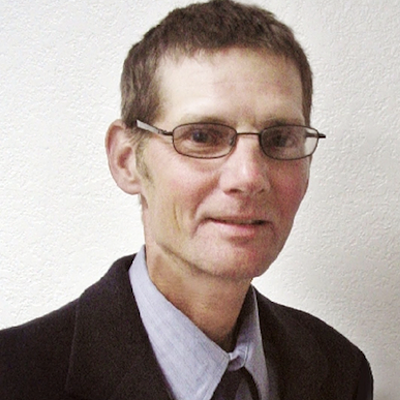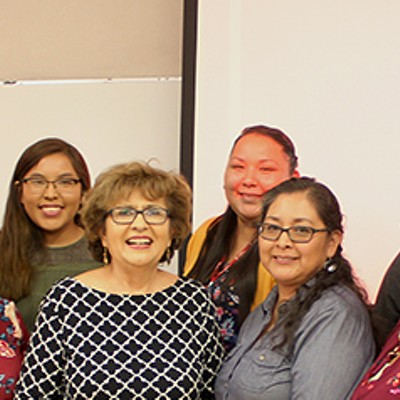As a result, tribal members from Mexico are often unable to visit relatives in this country, or receive medical services here that they're entitled to.
Even human rights accords pull little weight along the border. One was drafted by the United Nations, another by the International Labor Organization. Both demanded greater cross-border travel freedoms for indigenous people; both are ignored in the xenophobic maelstrom now driving American immigration policy.
It's a political mix creating practical problems for these traditional tribes. For the O'odham, it also highlights a sharp historical irony: With the 1853 Gadsden Purchase, the United States slashed a new boundary through the heart of their ancestral range. Today, some 1,000 tribal members remain scattered among small villages in Sonora, while their overall homeland has shrunk from about 60,000 square miles to less than 4,500 in this country, and 12 in Mexico.
The Yaquis fared little better. They began fleeing Mexico in the 1880s to escape bitter government persecution. Today, roughly 30,000 still live in northern Sonora, concentrated mostly along the Rio Yaqui, while population pockets are scattered north of the border in Tucson and Phoenix.
Present-day Yaquis and O'odham in Mexico find themselves prisoners not only of geopolitics, but also of simple red tape. "They're asked for passports or other documents to cross into the U.S. But often these people are from traditional communities, and don't have that kind of paperwork," says Jose Matus, a Yaqui spiritual leader and spokesman for the Tucson-based Derechos Humanos human rights group.
Then there's plain old seniority. "All indigenous people in Mexico are technically Mexican nationals," Matus says. "But tell that to a Yaqui or an O'odham, and they'll say, 'No, first I'm an Indian.' As Indian people, we should have the right to come across."
In turn, telling that to U.S. officials will get you a far different response--namely that they can't make exceptions among the millions of migrants trying to cross annually without proper documents.
So a few more chapters are added to the border's heart-wrenching saga.
A group of O'odham, traveling from their Mexican homes for medical help here on the Tohono O'odham Reservation--services accorded them as tribal members--are summarily stopped at the Lukeville crossing. They are marooned for hours. Some are turned back. Their driver, a tribal employee, is accused by INS officials of transporting illegals. She is harassed and nearly jailed.
An old Yaqui man journeying from Sonora to Tucson's Pascua Yaqui Reservation for a religious holiday is stopped at the Nogales port. His paltry documents are seized, and relatives spend two days in a rundown frontera motel struggling to get him into this country.
Following bad press over such incidents, the U.S. immigration service finally relented--slightly. "There was a long series of meetings between the INS, the (U.S.) State Department and representatives from the Tohono O'odham Nation," says Russell Ahr, a spokesman for the INS in Phoenix. He says the Mexican government also entered the parley because "tribal members couldn't get Mexican passports, and without Mexican passports they couldn't get visas, and without visas they weren't able to get into the United States."
They couldn't get passports because most hadn't served in the Mexican military, or lacked land titles proving domicile, Ahr says. He adds that the Mexican government has since eased those requirements. "Once they qualified for passports, and then visas from the State Department, essentially they reached the threshold that one could consider them for application for admission if they came to an INS port of entry.
"So this has been pretty much a successful experiment," he says.
Jose Matus begs to differ. "Now these Indian people have to buy their (INS permits) at $45 a head," he says. "And the Mexican government charges about $25 for a Mexican passport. Only about 100 people have been able to afford that.
"Either way, they're still Indian-aliens in their own land. That's the issue that needs to be addressed. Only then would I say that, 'Yes, the border-crossing problem has been solved.'"
Don't hold your breath, warns Robert Williams, UA law professor, author of The American Indian in Western Legal Thought, and a member of North Carolina's Lumbee Tribe. While border-crossing has become a major focus for the U.N. Working Group on Indigenous Populations, and is even covered in its draft declaration on the rights of indigenous people, "it's far from being enforceable in any sense," he says.
"It's also covered in the International Labor Organization Convention 169," he says. "But in the U.S., none of that really matters. In fact, the U.S. has been one of the principal obstacles to the (U.N.) Human Rights Commission's ratification of the draft declaration. The (State Department) has raised these issues about sovereignty, about whether or not the declaration goes too far in terms of self-determination for indigenous people."
Still, "a lot of international law experts will tell you that these are crystallizing norms, that the more these rights are put down on paper--even in draft declarations--the more they raise the level of the norm."
Several attempts to contact State Department officials for comment were unsuccessful.
Meanwhile, the legal fist remains tight for Indians facing a bitter boundary as Washington lawmakers look the other way. "The (politicians') primary mission is militarization of the border, and protecting the border," Williams says. "And they see the whole O'odham (and Yaqui) issue as just kind of clouding things and causing difficulties."
Either way, timeless desert dwellers like Matus are steeling for the long haul. "We've suffered enough in the last 500 years," he says. "I think we should have the right to move about as we please. Originally, this all was considered our country anyway."












